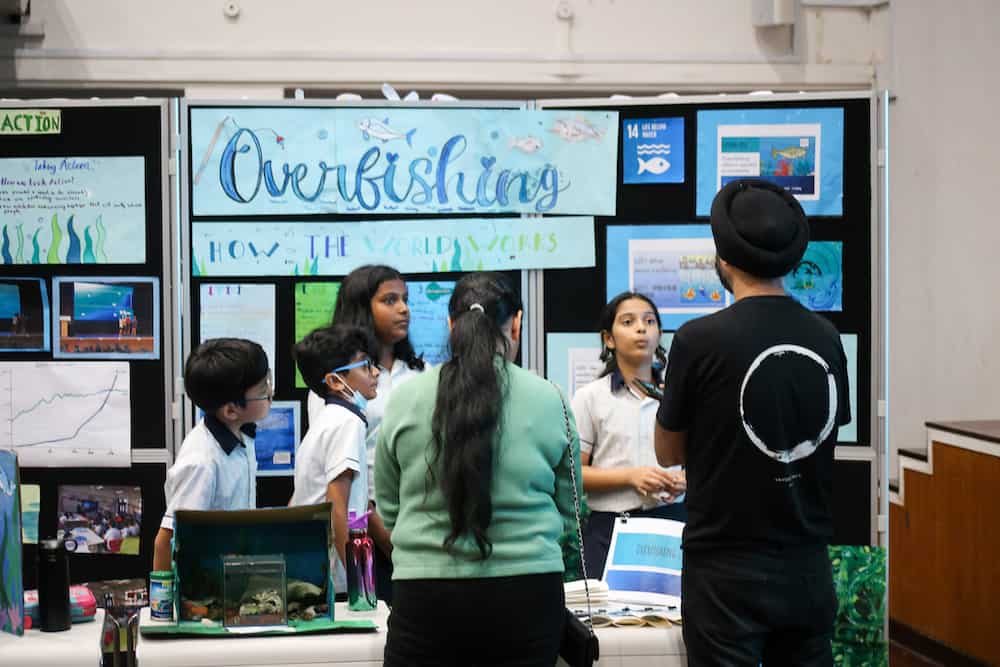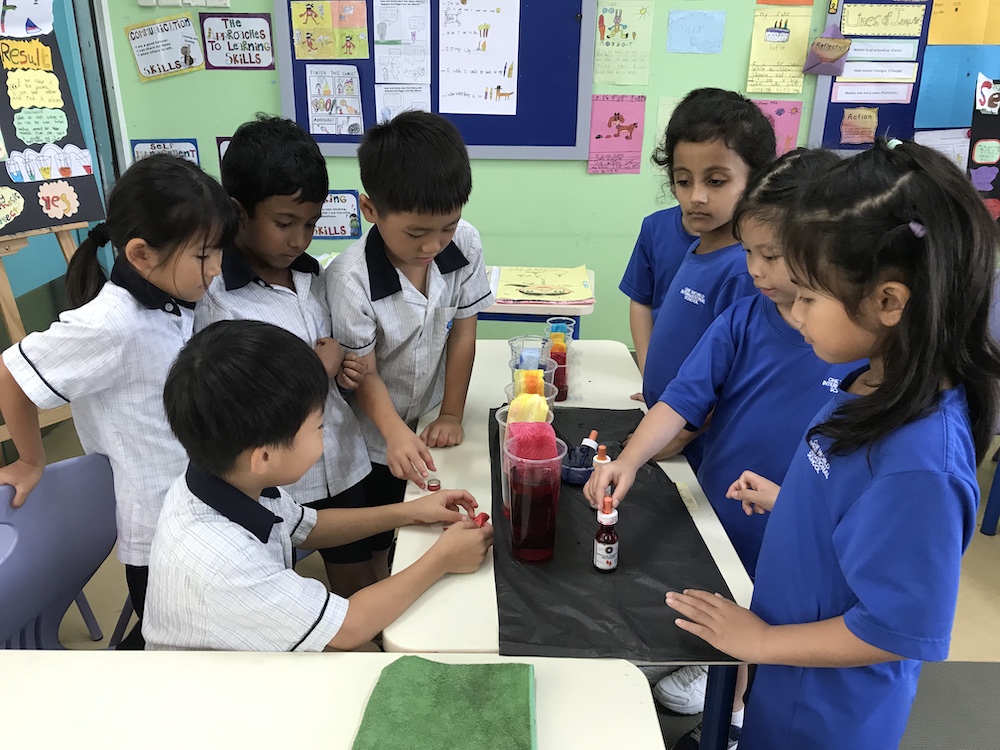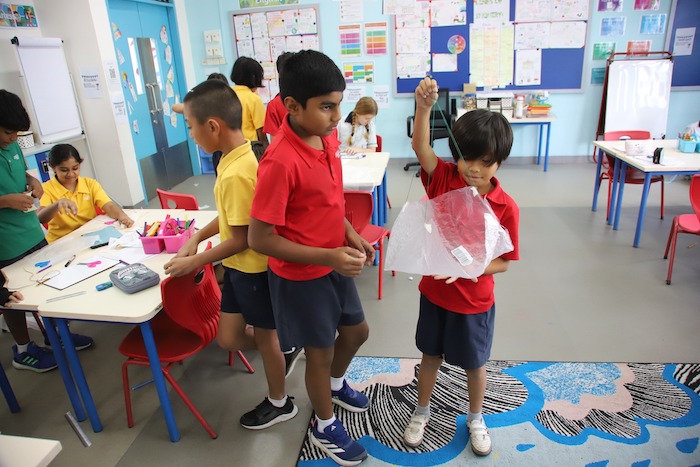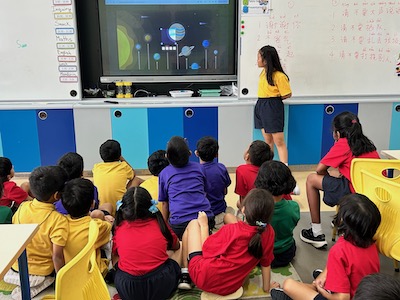The International Baccalaureate Primary Years Programme (IB PYP) is considered one of the most dynamic and effective curriculum frameworks for elementary students. At OWIS Nanyang, we have found that the IB PYP is the perfect option for our international school, as it provides students with rigorous coursework that supports academic growth and skill development — while still giving children the opportunity to connect and explore the world around them.
This comprehensive guide to the IB PYP will help you develop an in-depth understanding of this framework and understand why we have chosen to offer it to our primary students at OWIS Nanyang.
The IB Primary Years Programme
The IB Primary Years Programme is an inquiry-based, transdisciplinary framework that is designed for young learners between the ages of 3 and 12. Known for its multicultural approach to education, this framework is preferred by many of the leading international schools around the world. At OWIS Nanyang, we are proud to offer the IB PYP in our Early Childhood and Primary School.
Understanding the IB PYP Framework
By emphasising the importance of student agency, the IB PYP gives students the opportunity to take control of their learning experience.
The 3 Pillars of the IB PYP:
The Learner
The Learner pillar emphasises outcomes for each student and the importance of agency within the framework. By giving students a voice and choice at every stage of their educational experience, the IB PYP fosters an innate sense of self in every child who is enrolled at the school. Through hands-on, inquiry-led learning experiences, IB PYP students become aware of their learning styles and preferences, which allows them to guide and direct their education both now and in the future. As a result, students develop into agile, imaginative learners who are not afraid to take risks and try new things.
Learning and Teaching
Through the Learning and Teaching pillar, the IB PYP advocates for engaging, relevant and challenging coursework — ultimately allowing students to apply the concepts they are learning in the classroom across a wide range of subjects. The transdisciplinary approach is a fundamental component of the programme, helping students develop an in-depth, conceptual understanding of a wide range of topics that are becoming increasingly relevant in our modern world. In addition to promoting knowledge acquisition, this pillar also supports the development of 21st-century skills, such as critical thinking, communication, collaboration, research and self-management.
The Learning Community
The Learning Community refers to the importance of social outcomes in learning and the role that the larger community plays in this. Everyone involved in the school life is recognised as being part of the learning community: students and families, all staff members, and any other adults that play a significant role in the students’ lives. In PYP schools, the learning community builds shared understandings and agreements for quality teaching and learning.
The IB Learner Profile

While knowledge acquisition and academic achievement play a powerful role within the IB PYP, this framework aims to shape young learners into kind, respectful and compassionate individuals who recognise the needs of others and are aware of how their actions impact the community. The IB Learner Profile anchors the character development component of this framework by outlining the traits that each student should develop during their time in primary school.
The IB Learner Profile focuses on helping all students become:
- Inquirers
- Knowledgeable
- Thinkers
- Communicators
- Principled
- Open-minded
- Caring
- Risk-takers
- Balanced
- Reflective
The IB Learner Profile complements the kindness-based approach that is utilised at OWIS Nanyang. As a school that prioritises holistic development and personal growth, OWIS is able to naturally foster the qualities that are outlined within the IB Learner Profile.
Agency Within the IB PYP
Student agency is at the core of the IB PYP framework. Student voice and choice is at the forefront of every PYP classroom, with teachers tailoring learning experiences according to the students’ needs and interests. .
To support the development of student agency throughout the programme, teachers at OWIS Nanyang involve the students as much as possible in their own learning by providing differentiated options for tasks, creating hands-on stations within the classrooms and documenting their learning processes on wall displays. These endeavours build the students’ sense of belonging within their classrooms, ensuring that their voice is valued and celebrated.
Action Within the IB PYP
Another crucial component of the PYP framework is action. Students learn how to take action that can benefit local or global contexts through projects and learning experiences. By taking both individual and collective action in the classroom, students develop a sense of international-mindedness, recognise the power of working together toward a common goal and understand their own role in creating a better world. Some examples of action that OWIS Nanyang students have taken include raising funds for various charities, advocating for social causes and proposing changes to the school campus to make it more environmentally friendly.
Inquiry-Led Learning in the IB PYP
While the IB PYP supports academic growth and development, it takes a different approach than most traditional curricula. Rather than providing students with fact-based information and expecting them to memorise and reiterate, the IB PYP takes an inquiry-led approach. This is one of the reasons we chose to implement this framework in the Primary School at OWIS Nanyang.
Students explore new topics and concepts in an age-appropriate way, allowing them to engage in discussion, ask questions and come up with solutions. Inquiry-led learning has been shown to lead to deeper, longer-lasting connections with the material, and it best supports the transdisciplinary structure of the IB PYP.
The Benefits of the IB PYP

The IB PYP offers exceptional learning outcomes for students between the ages of 3 and 12 along with a wide range of skill sets and traits that students continue to use throughout their lives.
- Increases Engagement
By prioritising inquiry-led learning, the IB PYP increases engagement among students of all ages. Students recognise from an early age that they play a valuable role in the classroom, and that their success depends on their willingness to interact with their classmates and engage with the learning materials. By instilling a sense of agency,, this framework empowers students . Knowing that they have a say in what they learn and how they learn it fosters a natural sense of motivation and helps them develop into curious, lifelong learners.
- Fosters Character Development
Knowledge acquisition is not the only goal of this programme. With the IB Learner Profile at the forefront, this framework helps students develop into the best version of themselves. Students have access to multicultural learning experiences that foster international-mindedness, which in turn, provides them with a competitive advantage in our increasingly globalised world. In addition, they learn first-hand about the power of empathy, compassion and awareness. Students are given ample opportunity for reflection, which allows them to not only consider the material that they have learned but also become more aware of the role they play in their learning environment.
- Promotes Skill Development
Classroom discussions play a central role within the IB PYP at OWIS Nanyang, thanks in large part to this framework’s commitment to inquiry-led learning. Instead of having a short Q&A at the end of the class, teachers encourage students to share ideas through group and pairwork. Teachers serve as facilitators rather than as instructors, often taking the lesson in the direction that students choose. As a result, students naturally develop a refined set of critical 21st-century competencies — such as critical thinking, research, collaboration, creativity and communication — which are becoming increasingly necessary in the global economy.
- Develops Powerful and Lasting Real-World Connections
The transdisciplinary nature of this framework, combined with its concept-based, inquiry-led approach, allows students to develop long-lasting connections to the material that they learn and gives them the ability to apply that knowledge to real-world scenarios.
The IB PYP framework relies on six transdisciplinary themes, all of which are utilised when covering different subject areas. The IB themes include:
- Who We Are
- Where We Are in Place and Time
- How We Express Ourselves
- How the World Works
- How We Organise Ourselves
- Sharing the Planet
These transdisciplinary themes bridge the gaps between subject areas, helping students understand how their newfound knowledge applies to different contexts in their daily lives. The transdisciplinary themes are woven into the IB PYP subject areas, which include language, social studies, mathematics, arts, science and personal, social and physical education. As the IB PYP spans from the early years until the middle years, these subjects are presented in varied ways, depending on the age and development of the students.
- Complements Holistic Education Efforts
At OWIS Nanyang, we are proud to offer a holistic education, one in which students’ academic, emotional, social and physical needs are met. The inquiry-led, discussion-based approach of the IB PYP naturally complements our commitment to holistic learning, allowing all students to become the best version of themselves during their time in primary school.
While students are constantly collaborating and applying their learning to the world at large, their well-being is always a priority within the IB PYP. Through agency and action, students have the opportunity to curate a learning experience that meets their needs, allowing them to hone their strengths and overcome challenges.
By supporting character development with the IB Learner Profile and simultaneously providing students with comprehensive pastoral care, we help our youngest learners develop a supportive foundation that they can rely on for a lifetime.
- Creates Lifelong Learners
The inquiry-led approach of the IB PYP fosters a natural sense of curiosity in students, empowering them to ask questions and creating confident young minds that are willing to take risks and seek answers well into their adult lives.
How the IB PYP is Implemented at OWIS Nanyang

At OWIS Nanyang, our holistic curriculum allows us to effortlessly implement the IB PYP in our primary school. We apply the IB PYP framework through:
- Open-Concept Classrooms — The classrooms at OWIS Nanyang are uniquely designed to support the learning outcomes of the IB PYP. Furniture is strategically placed to foster and encourage discussion, and students have plenty of space to collaborate and engage in hands-on learning.
- State-of-the-art Technology — Rather than relying on technology to replace traditional teaching methods, we offer the latest digital tools and resources to complement the IB PYP framework. Students hone their digital literacy and technology skills while exploring the subject matter.
- Qualified Teachers — All our teachers are IB-trained professionals who know how to effectively implement this framework to achieve learning outcomes and develop IB Learner Profile attributes.
Learn More About the IB PYP at OWIS Nanyang Today
We invite you to see how the IB PYP is effortlessly implemented at OWIS Nanyang. As the leading international school in Singapore, we are proud to anchor our holistic framework with the IB PYP, which supports the whole child development of every student at our primary school.
Schedule your campus tour, and learn more about how our students benefit from the IB PYP.















